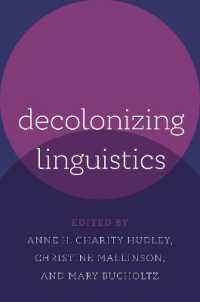Full Description
This is an open access title available under the terms of a CC BY-NC-ND 4.0 International license. It is free to read at Oxford Academic and offered as a free PDF download from OUP and selected open access locations.
Inclusion in Linguistics, the companion volume to Decolonizing Linguistics, aims to reinvent linguistics as a space of belonging across race, gender, class, disability, geographic region, and more. Taken together, the two volumes are the first comprehensive, action-oriented, book-length discussions of how to advance social justice in all aspects of the discipline.
The volume's introduction theorizes inclusion as fundamental to social justice and describes the extensive dialogic and collaborative process through which the volume was developed. Contributors discuss intersectional forms of exclusion in linguistics: researchers' anti-autistic ableism; the exclusion of Deaf Global South researchers of color; the marginalization of Filipino American students and scholars; disciplinary transphobia; and the need for a "big tent" linguistics.
The volume goes on to outline intersectional forms of exclusion in linguistics, describes institutional steps toward inclusion, offers examples of how to further educational justice, and shares models of collaborations designed to create an inclusive public-facing linguistics. The volume's conclusion outlines actions that linguists can take through research, teaching, and institutional structures to advance inclusion in linguistics and move the field toward social justice.
Contents
Preface
Introduction: Inclusion in Linguistics
Christine Mallinson, Jon Henner, Anne H. Charity Hudley, and Mary Bucholtz
Part 1: Intersectional Inclusion in Linguistics
1. How to Train Your Abled Linguist: A Crip Linguistics Perspective on Pragmatic Research
Jon Henner
2. Critically Examining Inclusion and Parity for Deaf Global South Researchers of Colour in the Field of Sign Language Linguistics
Lynn Hou and Kristian Ali
3. We Need to Be Telling Our Own Stories: Creating a Home for Filipinx Americans in Linguistics
Julien De Jesus
4. (Trans)forming Expertise: Transness, Equity, and the Ethical Imperative of Linguistics
deandre miles-hercules
5. Toward a Big Tent Linguistics: Inclusion and the Myth of the Lone Genius
Rikker Dockum and Caitlin M. Green
Part 2: Linguistics for All: Disciplinary and Institutional Pathways for Inclusion
6. Increasing Access and Equity for First-Generation Scholars in Linguistics
Iara Mantenuto, Tamaya Levy, Stephanie Reyes, and Zhongyin Zhang
7 For the Culture: Pathways in Linguistics for Black and HBCU Scholars
Candice Y. Thornton
8. Towards Greater Inclusion in Practice and Among Practitioners: The Case for an Experience-Based Linguistics in India
Reenu Punnoose and Muhammed Haneefa
9. Power Shift: Toward Inclusive Natural Language Processing
Emily M. Bender and Alvin Grissom II
Part 3: Creating Just and Inclusive Classrooms
10. Disrupting English Class: Linguistics and Social Justice for All High School Students
Amy L. Plackowski
11. Bilingual Education in Cabo Verdean: Toward Visibility and Dignity
Abel Djassi Amado, Marlyse Baptista, Lourenço Pina Garcia, Ambrizeth Helena Lima, and Dawna Marie Thomas
12. Community College Linguistics for Educational Justice: Content and Assessment Strategies That Support Antiracist and Inclusive Teaching
Jamie A. Thomas
13. Texts, Tweets, Twitch, TikTok: Computer-Mediated Communication as an Inclusive Gateway to Linguistics
Jenny Lederer
14. Pedagogies of Inclusion Must Start from Within: Landguaging Teacher Reflection and Plurilingualism in the L2 Classroom
Rhonda Chung and John Wayne N. dela Cruz
15. Beyond Pronouns 101: Linguistic Advocacy for Trans-Inclusive Language in the College Classroom
Lal Zimman and Cedar Brown
16. Increasing Inclusion Through Structured Active Learning: Curriculum Changes in an Introduction to Formal Linguistics Class
Florian Schwartz
17. An Action-Based Roadmap for Equity, Diversity, and Inclusion in Teaching Linguistics
Nathan Sanders, Lex Konnelly, and Pocholo Umbal
Part 4: Fostering Community Partnerships and Public Engagement
18. Creating Inclusive Linguistics Communication: Crash Course Linguistics
Lauren Gawne, Gretchen McCulloch, Nicole Sweeney, Rachel Alatalo, Hannah Bodenhausen, Ceri Riley, and Jessi Grieser
19. The Justice Language Action Project: Critical Linguistics for Inclusion and Equity in K-12 Classrooms
Jennifer Sclafani, Panayota Gounari, Iuliia Fakhrutdinova, and Vannessa Quintana Sarria
20. Linguistic Literacy and Advocacy in Action: Case Studies in Community Engagement from the Language Diversity Ambassadors at North Carolina State University
Marie Bissell, José Álvarez-Retamales, Matthew Champagne, Jessica Hatcher, Shalina Omar, and Walt Wolfram
Conclusion: Inclusion in Linguistics
Christine Mallinson, Jon Henner, Anne H. Charity Hudley, and Mary Bucholtz








